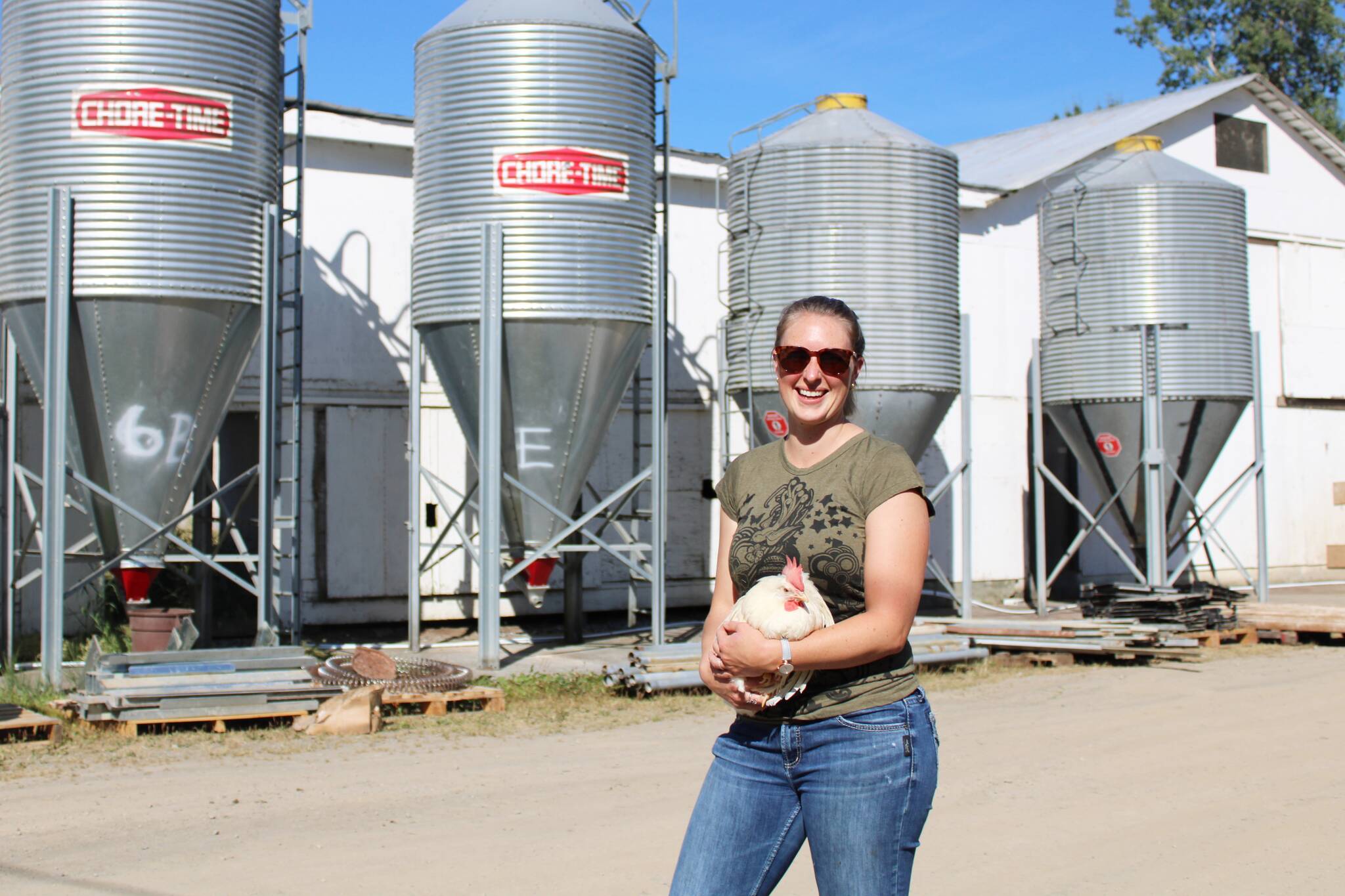Terrace egg producer Daybreak Farms can now double its flock of chickens after the city approved its request to revamp and expand its operations. It’s the only egg producer and grading station in northwest B.C. and has had its home in the area known as the bench since the 1950s, before the city was incorporated, previously as Sampson’s Poultry Farm.
But the farm faced opposition from more recent neighbours who complained about flies and the smell of chicken manure wafting over the surrounding area of north Eby Street on the bench, making for some unpleasant backyard BBQs.
Other residents and leaders have strongly supported the farm, pointing to benefits like food security and jobs. The farm supplies eggs across the north, from Haida Gwaii to Prince George, to more remote communities like Dease Lake and to hospitals through Northern Health.
Kieran Christison of Daybreak Farms said they spoke with neighbours, consulted with and received support from Northern Health, the Nisga’a Nation, the Kitselas and Kitsumkalum First Nations, Skeena—Bulkley Valley NDP MP Taylor Bachrach, Skeena MLA Ellis Ross and B.C. Minister of Agriculture Lana Popham, among others, before presenting to council at a public hearing Aug. 8.
The application centres around a 1995 zoning bylaw that put the farm into non-compliance because it no longer allowed for intensive agriculture. The owners considered relocating but found that was not financially doable.
The farm plans to invest roughly $10-million in production and environmental upgrades that will bring them into compliance with upcoming legislative changes, and centralize operations to their main property.
“My family purchased what is now known as Daybreak Farms in 1992, and within the limitations of the current zoning has made significant improvements,” Christison said.
“Daybreak contributes to Terrace and the surrounding communities by offering fresh eggs which otherwise would be shipped in from neighbouring provinces or the Lower Mainland.”
She said upgrades will reduce or eliminate nuisances to the neighbourhood and bring certainty to the farm’s future by keeping up with modern egg farming practices in B.C.
“This will improve living conditions for chickens, minimize waste through clean composting, reduce neighbourhood impacts and will protect the local food supply in the northwest for years to come.”
Kitselas First Nation Chief Councillor Glenn Bennett voiced his support, saying the experience of food insecurity during the pandemic shows just how important food security is to the community.
“Store shelves were quickly reduced to nothing… Food was very challenging to get up here to the northwest,” Bennett said.
“Daybreak Farms is a local industry and they provide a local product that our people everywhere use to feed their families… I certainly believe in the work that Daybreak Farms is doing.”
But Troy Ritter, who lives nearby, said the current flock of 40,000 chickens at the farm is already affecting “everybody in the immediate area” and the huge fly populations become intolerable on sunny days.
“I invite any one of the council members to come into my property on a warm day and see what we’re up against,” Ritter said.
“It’s gotten worse to the point where last year we just left our property. We couldn’t be there, couldn’t be outside, we had to leave the property. The proposal for the increase of 80,000 chickens is unbelievable to me.”
Ritter said 50 residents living nearby are worried about property devaluation from the operation of the farm and increase in the number of chickens, adding that recommendations from the provincial government’s Farm Industry Review Board have not been fully enforced.
“It’s been a constant headache for the City of Terrace and the residents that surround the farm.”
Catherine White, who teaches biology at Coast Mountain College, spoke in favour of the farm. White did her PhD and post-doctorate work in microbiology, with a focus on bacteria that are relevant to agriculture.
White said even with a two-fold increase in the number of chickens, she expects fly populations and smell to decrease as the farm modernizes. “Speaking as a microbiologist I’m in full support of the plan,” White said.
She explained that odours from the farm are caused by bacteria that thrive in wet manure. The farm’s new waste management system will dry the manure and store it a way that will reduce the smell, which is what attracts flies, solving both problems.
White added that the proposed composting system for waste other than manure is “an excellent idea” because it will eliminate pathogens like e-coli and salmonella while killing any parasites.
“So, what you get as a waste product from that is this super compost which is clean, free of parasites and pathogens and excellent to use in the garden.”
Katie Lowe, executive director at the B.C. Egg Marketing Board that oversees egg farming in the province, told council the industry has grown by about 20 per cent since about 2015 and there is room for Daybreak Farms to expand.
She said aside from Terrace, egg production and grading in B.C. only happens on Vancouver Island and the Fraser Valley. There’s production in Salmon Arm and Kamloops, but those eggs have to be shipped out for grading, which is the process of sorting eggs for quality control.
“What we saw in the floods, we couldn’t get any product out of the Fraser Valley, we were an island unto ourselves. So, we may have had a ton of eggs in the Fraser Valley but we were’t able to get them to the rest of the province,” Lowe said.
“I think being in the north, and thinking about food sustainability and security, having that production right there at your doorstep is a great benefit to everyone up there.”
READ MORE: Egg-normous: Daybreak Farms eyes multi-million dollar modernization project
READ MORE: Skeena Voices| Sunny-side-up
Do you have a comment about this story? email:
michael.willcock@terracestandard.com

